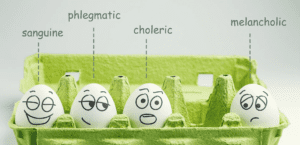
What is the Sanguine Personality Temperament?

The Sanguine Personality Temperament is known as the Expressor/Talker Temperament.
It is the most common temperant type, typically a primary or secondary Temperant, and is as likely in men as in women.
Some people are considered “Super Sanguine” because they are so overly talkative and active that it can be overwhelming to be around them.
The Sanguine Personality Type is generally carefree, optimistic, lively, and likelier to go out of their way to experience anything challenging!
While their lively and joyous Personality can be invigorating, their boredom kicks in faster than anyone, and they constantly look for various ways to be entertained. Because of this, they will tend to jump between interests until they find something that sticks.
Those with a Sanguine Personality Type tend to have a flair for the arts and are known to be more creative.
With their friendly and social demeanor, being a good host or an entertainer comes quickly, and their natural abilities in this area will benefit them in the long run.
Sanguine Temperament Personality Type cross-reference
- Keirsey Type – Artisans
- Animal Type – Golden Retriever
- DISC Type – Steadiness
- Socio-Communicative Type – Amiable
- True Colors – Orange
- Color Code – Yellow
- Personality Compass – South
- Occupational Type – Conventional
MBTI Personality Types (xSxP) – Sensing and Perceiving
Enneagram Types
- Type 2 – The Helper (ESFP, ISFP)
- Type 6 – The Loyalist (All Sensing)
- Type 7 – The Enthusiast (ESTP, ESFP)
- Type 9 – The Peacemaker (ISFP)
Sanguine Temperament Strengths
- They are open and positive.
- They are the talkers.
- They are very social and love people.
- They enjoy being popular and influencing and motivating others.
- They can sometimes be hurt when people do not like them.
- They usually have lots of friends—still, not deep relationships.
Sanguine Temperament Weaknesses
- They often talk too much.
- They tend to be too permissive.
- They love to waste time.
- They are notorious for messy rooms.
- They often like to hurry and finish jobs.
Sanguine Temperament Limitations
- They are poor with commitments.
- They lack discipline.
Sanguine Temperament Orientation
Those with the Sanguine Temperament Type are significantly people-oriented.
- They are outgoing and extraverted and extraordinarily talkative and social.
- They encourage people to work together and do good things for one another.
Sanguine Temperament Traits
People with the Sanguine Temperament Type have many emotions and behaviors.
- They are the most versatile of all the temperaments.
- Depending on their secondary Temperament, they might be involved in nearly any human activity.
- However, they enjoy occasions when they can interact with or change their environment.
Sanguine Temperament people are playful and impulsive.
- They are constantly active and always optimistic.
- They have a good sense of humor, are entertaining, and are easily amused.
- They are also expressive and affectionate.
- They build relationships quickly and are trusting of others.
When you first meet someone with a Sanguine Temperament, you’ll likely feel you’ve known them for a long time.
- They are comfortable talking to and getting to know each other.
- They are extremely friendly, talkative, and social.
- They will frequently get caught up in conversations and lose track of time.
- However, if they get bored, they can lose attention quickly.
- Their attention span is directly related to how much they enjoy the conversation or what they do.
Sanguine Temperaments are also highly dynamic. Therefore, if they think or feel it, they will say it.
- They have no filter.
- Their hyperactivity often leads to forgetfulness and being disorganized.
The Sanguine Temperament Type is highly competitive.
- They dominate sports, politics, and the business world.
- They also fear making a wrong impression and rejection.
- They want the most to be accepted and the best they can be.
Sanguine Temperament Careers
Personality Temperaments, Traits, and Types
Personality Temperaments, Personality Traits, and Personality Types are used in Psychology to discuss a person’s Personality, a collection of Emotions, Perceptions, and Actions that interact with each other, regulate themselves, and shape a dynamic system that forms a person’s Behavioral Patterns.
Your inherited traits (your personality Temperance) and acquired traits (such as education, socialization, and other various pressures and aspects) form your Personality.
A Personality Type identifies a specific collection of Traits, both learned and natural, that comprise a broad, general Personality Classification—a way of labeling a collection of traits and behaviors.
A Personality Trait remains consistent and stable over time, which means you exhibit the same pattern across different situations and throughout your life.
Three criteria characterize Personality Traits: (1) consistency, (2) stability, and (3) individual differences. For example, if you are talkative at home, you also tend to be talkative at work. And if you were talkative at age 20, you would still be chatty at age 40.
Personality Temperament is your “Naturally Intuitive” biological Trait. These Traits are partly inherited from your genes and partially determined by your brainstem, which doesn’t change throughout your life. These are Natural Traits regarded as innate or inborn and not learned.
Your Personality Temperament is formed as an infant and is hard to modify, manipulate, or change because it is genetic. In some way or another, your inherited behavioral tendency will always be there.
Personality Traits are quantitative differences between people, and Personality Types are qualitative differences between people. The most crucial difference between the Trait Theory and the Type Theory is that the Type Theory views people’s characteristics as discrete categories, while the Trait Theory views these characteristics as a continuum.
For example, while a Type Theorist would claim that introverts and extraverts are two types of people, a Trait Theorist claims that extraversion is a gradient, and individuals can fall somewhere in the middle.
Your Temperaments, along with acquired Traits, form your Personality.



